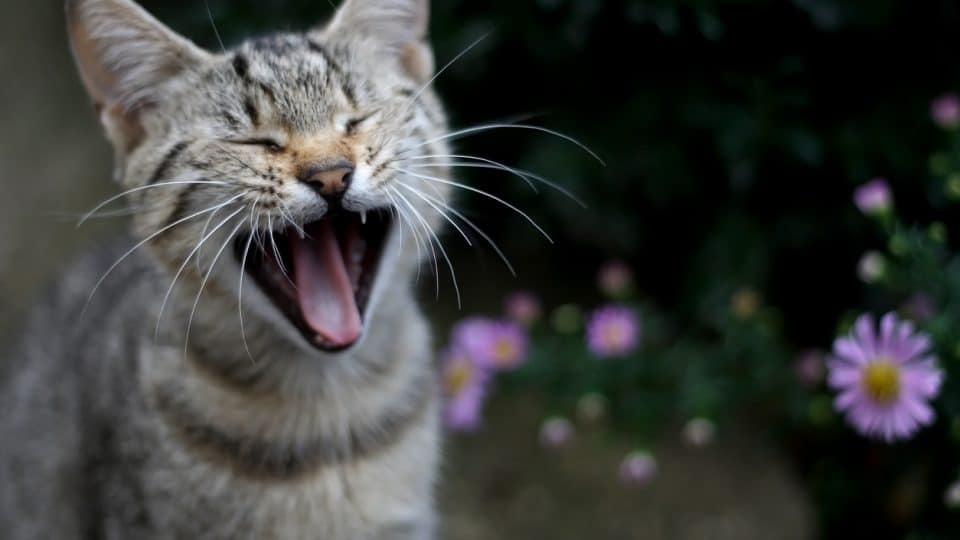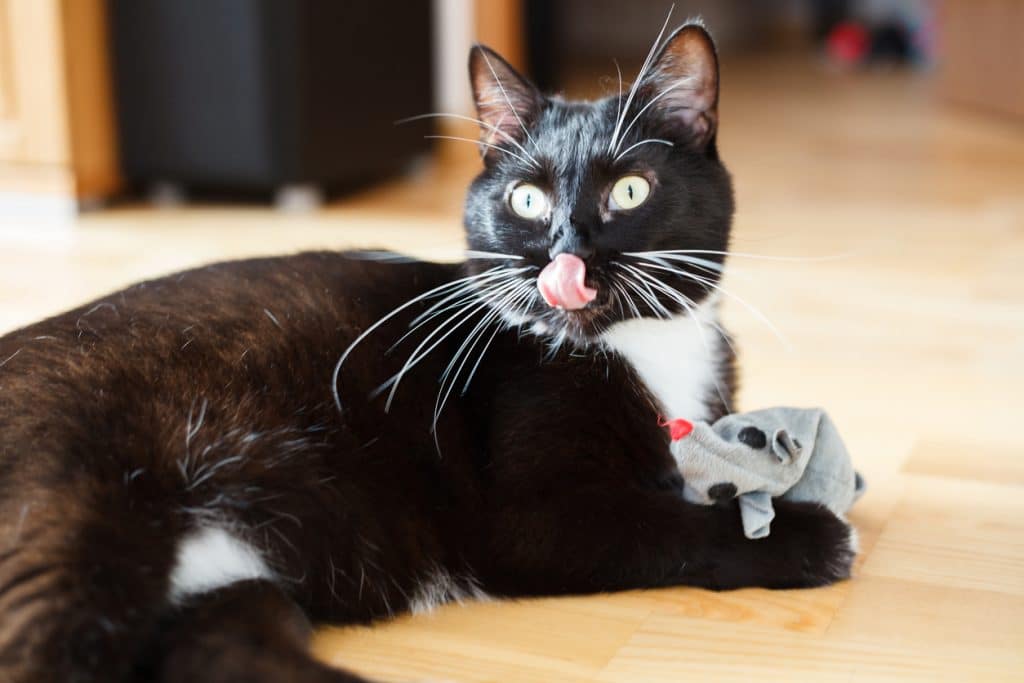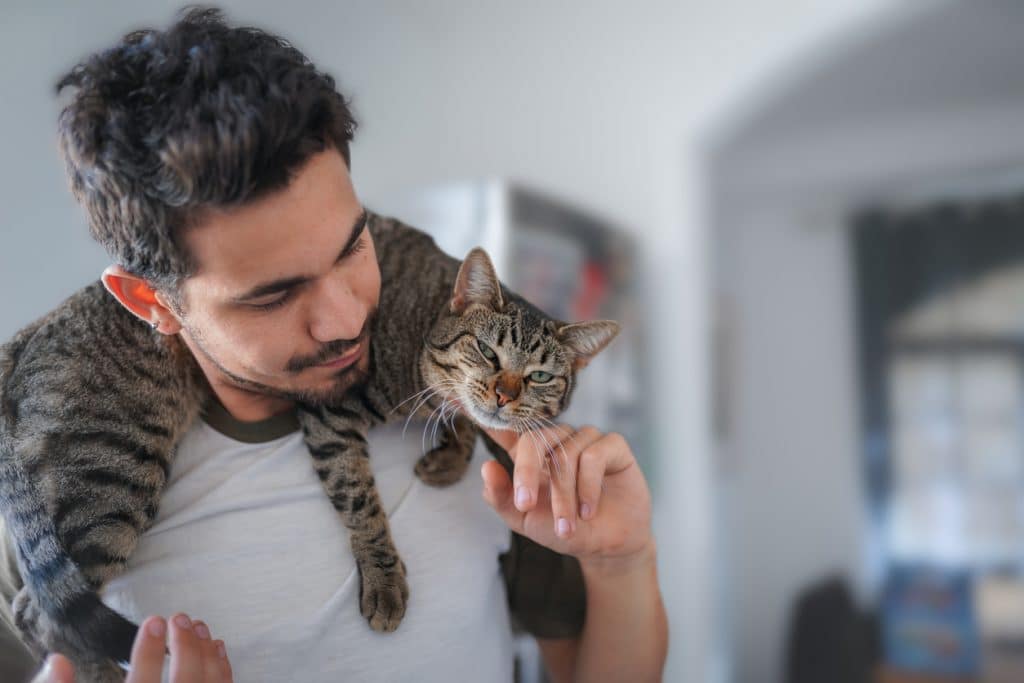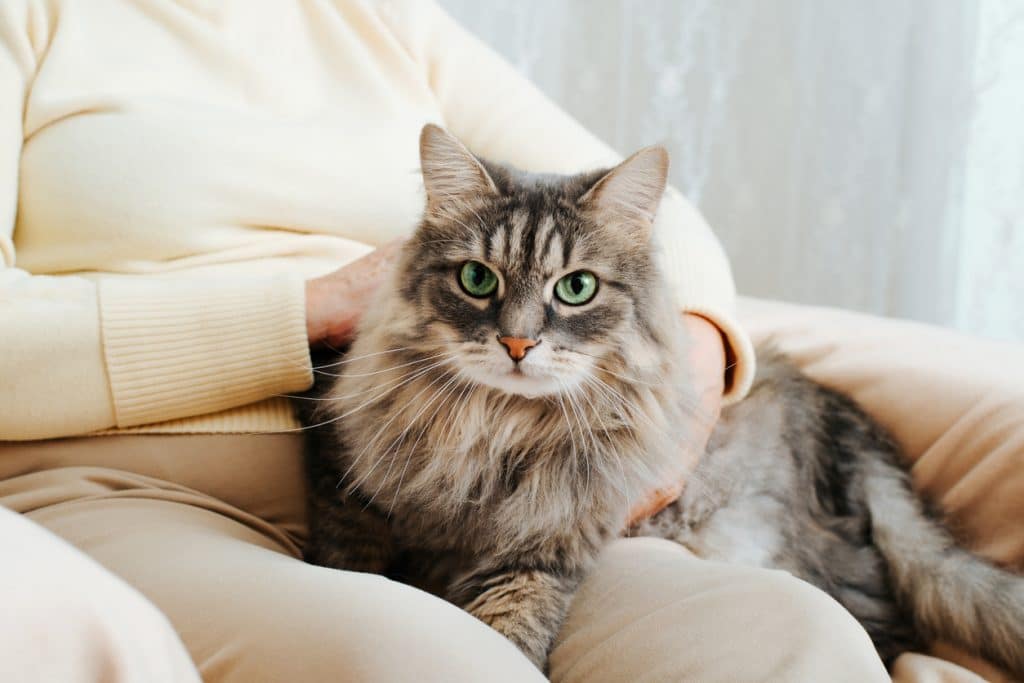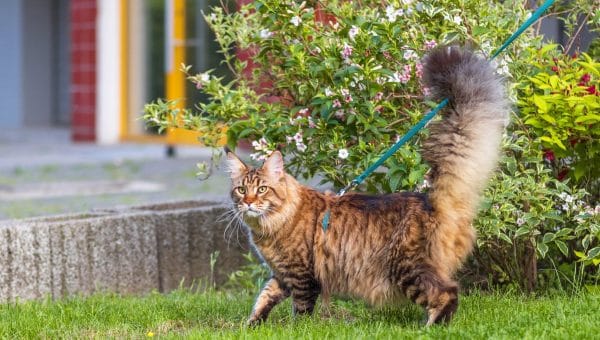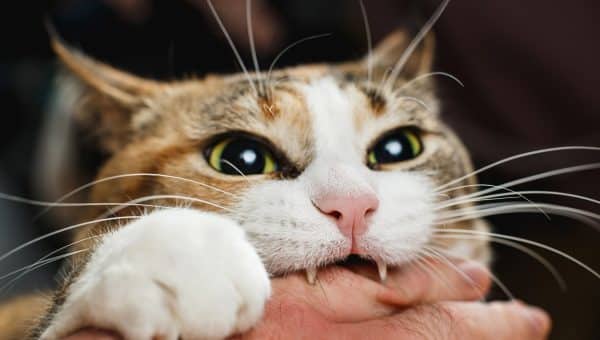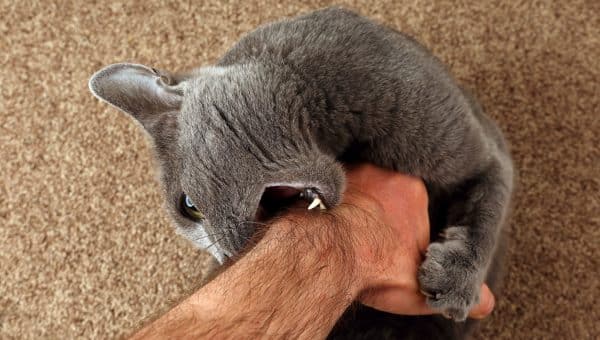It’s not always easy to understand why your cat has become chattier—or worse—is keeping you (and the neighbors) up at night with her yowls. Recognizing what might be causing her assertive nighttime chats is the first step towards keeping your cat happy and healthy, and getting back to a peaceful night of sleep. Luckily, some reasons for cats yowling at night can be solved without a visit to the vet, but it’s always best to speak to your vet who’ll be able to rule out any underlying health concerns.
The size of a cat’s “vocabulary” might surprise you says Dr. Mikel Delgado Rover’s resident cat expert on The Dog People Panel. Meows come in all different tones and are thought to be a learned response effective in getting human attention. If your cat is yowling at night, her attention-grabbing strategy is probably working, now it’s up to you and your vet to get to the root of the cause. Here are some common reasons why your cat is yowling at night.
Normal Reasons Your Cat Yowls At Night
Instinct
Despite common belief, cats aren’t nocturnal; they’re actually crepuscular, which means they’re most active at dawn and dusk. It might feel like the middle of the night, but cats begin to stir at dawn following late-night zoomies at dusk. It’s during these wee hours of the night and morning that your crepuscular hunter might yowl for extra playtime or food.
To stop her early-morning yowling, Dr. Delgado recommends engaging in playtime before bed. Just be sure to complete the predatory sequence—that is, playing a game that allows her to stalk, catch, “kill”, and eat her “prey”. “Try an exercise session with a feather wand in the evening, followed by a meal or treat,” Dr. Delgado recommends.
Overstimulation
Cats that are experiencing overstimulation can become more vocal. Overstimulation in cats could be caused by rough play, major household changes, or during or after active times.
The first step is pinpointing the stressor and eliminating or lessening the interaction. Because some cats get sleepy after the rush of catnip, a catnip toy or treat before bed could soothe your overstimulated cat. For cats that don’t react to catnip, CBD for pets is a go-to solution for its antipsychotic and anti-anxiety properties.
Playtime and attention
“Cats can definitely get bored,” Dr. Delgado says. “This is especially true if their environment doesn’t allow them to explore or express natural behaviors, such as hunting, stalking, and climbing.” Signs that your cat might crave more playtime and attention include:
- Excessive vocalization like yowling, meowing, or night calling
- Lack of interest
- Anxious behavior
- Overeating
- Getting into mischief
- Behavioral issues with other pets
The secret to preventing boredom in cats? Dr. Delgado says it’s all about balancing a stable environment with a bit of novelty to challenge them. Rotating toys in and out of play and providing stimulating activities—like these seven clever cat puzzle toys could do the trick. It’s best to not encourage your cat to yowl for playtime, so toys that promote self-play are a good option for late-night entertainment.
Territorial
Yowling at night could be a warning to other cats, non-feline animals, or humans that they’re invading her space. The “intruder” could be outside your home or inside (like a new pet). “In general, cats are very territorial animals,” Dr. Delgado says. “The strength of this homebody-tendency can vary greatly depending on a cat’s personality and previous experiences.”
This aggressive, territorial yowl is also known as caterwauling. Once you’ve checked with your veterinarian to rule out a medical issue, one of these suggestions might soothe your cat.
- Spraying cat calming pheromones
- Providing your cat with a safe place to call her own
- Offering opportunities for play, scratching, and enrichment
Mating
If your cat isn’t spayed or neutered, they could go into heat as early as four months of age. When in heat, female cats make loud, unusual sounds like yowling. And, in turn, male cats will respond with equally loud yowls.
Signs that your cat is night calling to mate:
- Increase in affection
- Spraying urine
- Rubbing their face on objects
- Putting their hindquarters in the air
Fixing your pet has a lot of benefits—including putting a stop to nighttime yowling and other behavioral problems that accompany a cat in heat.
Environmental factors
When your cat is acting out of the ordinary, the solution could be as simple as giving her environment a look-over. Dr. Katherine Pankratz, DVM, Behavioral Medicine Clinician at Animal Behavioral Clinic in Portland, Oregon says to focus on the five pillars of a healthy feline environment by asking yourself these questions:
- Does my cat have multiple “key environmental” resources like a clean litter box, freshwater, and sleeping areas?
- Are there any odors that could impact my cat’s sensitive sense of smell?
- Does my cat have a safe place she can withdraw to when needed?
- Does my cat have an opportunity to play and feel enriched mentally and physically?
- Have I positively interacted and bonded with my cat today?
If there’s a change in your cat’s environment or routine, stress or anxiety could lead to caterwauling at night. Need help identifying the stressor? Your vet or behavioral specialist can help identify the trigger and provide solutions for relief.
Separation anxiety
“Cats do have a social side to them and can experience loneliness,” Dr. Pankratz says. Separation anxiety is the most common form of anxiety in pets and could be caused by separation from a human or furry companion. “There are many symptoms of separation anxiety including vocalization when they are left alone,” Dr. Pankratz explains. Other signs of separation anxiety in cats can include:
- Yowling
- Extra purring and stretching after you’ve been gone
- Increased desire for affection
- Agitation or stress
- Destructive behavior
- Physical illness
When A Nighttime Yowl Is More Serious
Thyroid issues
Although common among senior cats, hyperthyroidism in cats can be hard to spot. Symptoms can start mild and mimic other issues. For example, the hormonal imbalance caused by thyroid issues causes your cat’s body to think she needs more food to meet her nutritional needs. Thyroid issues can cause other forms of confusion too, leading your cat to night-call for help.
Because hormonal imbalances could be an underlying symptom of other conditions, it’s best to make an appointment to see your vet. Your vet may recommend medicine, iodine treatment, thyroid surgery, or a change in diet to treat thyroid issues in cats.
Kidney issues
If your cat is yowling at night and it’s accompanied by these other signs, kidney disease could be to blame.
- Increased thirst
- Frequent urination
- Weight loss
- Decreased appetite
- Lack of energy
- Poor grooming habits
Poor kidney function in cats can be uncomfortable, causing restlessness, distress, or vocalization. Sadly, kidney disease is not curable. But you can help slow the progression by feeding her a diet of wet food low in phosphorus and insuring she is drinking plenty of water, in addition to regular visits with your vet.
Arthritis
If your cat’s joints are feeling a little creaky, arthritis could cause her to yowl in pain. Accompanied by mobility issues like limping, stiffness, and the inability to jump or move quickly, there are steps (like these steps for cats and dogs) you can take to make life a little easier for your senior cat:
If your cat is making strange noises like howling at night, it’s best to check with your vet to roll out other conditions that could cause her pain or discomfort.
Cognitive dysfunction
Just like humans, cats are at risk for dementia in their elder years. Dementia in cats is called feline cognitive dysfunction and it typically affects kitties 10 years of age or older. If your elderly cat is yowling at night and it’s accompanied by other behavioral changes, she could have feline cognitive dysfunction.
The condition could cause disorientation, especially if your senior cat’s vision is poor. Installing kitty nightlights could help your cat see, keeping her safe from injury and reducing the need to yowl for assistance.
The takeaway
Yowling at all hours of the night can be a handful for any cat parent. If you’ve experienced it, then you’ve probably wondered, “how can I stop my cat from yowling at night?” The good news is that with small changes at home or with the help of your vet, you and your cat can find relief.
Yowling at night could signal a few different things—from needing the litter box cleaned, wanting to play, or underlying health conditions. Narrowing down the reasons for your cat’s yowling and providing a solution will not only help you get some sleep, but it will help your kitty feel her best. When in doubt, talk to your vet about her behavior, possible triggers, and solutions.
